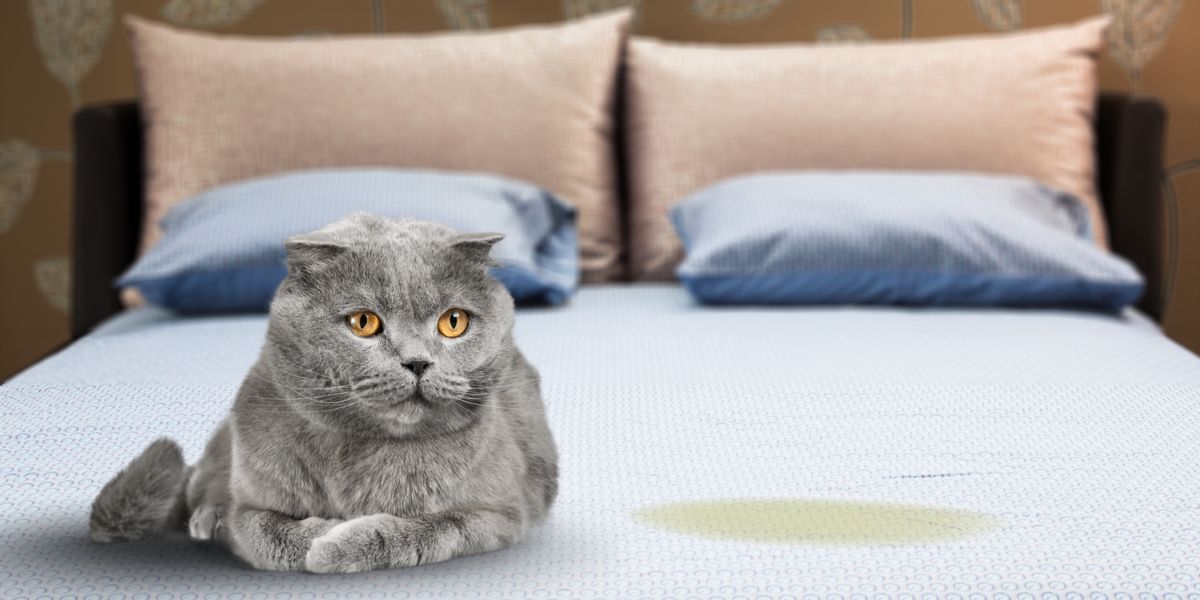
Elimination in unacceptable locations particularly on an owner’s bed is serious stuff which might drive a pet parent to madness and sadly to cat relinquishment, abandonment even euthanasia.
All feline species use their urine to communicate; either through squatting or by spray marking on vertical surfaces, unfortunately humans can’t detect house soiling signal messages yet.
Since our feline companions are masters of disguise, preferring to hide signs of weakness, we want to be able to pick up on subtle signs of distress, illness or pain via behavioural changes.
Let’s review why would your cat pee on your mattress together with interventions for successful redirection back to the tray.
Quick Overview: Why Is My Cat Peeing On The Bed





Causes of Inappropriate Urination
Theoretically the term ‘Inappropriate urination’ is merely ‘inappropriate’ to humans, however, could be appropriate for your cat who is trying to communicate with you that something isn’t well in their world.
Most widespread causes of bed wetting include:
Medical Conditions
First and foremost, any cat displaying urination outside the tray should be examined by a veterinarian and undergo a full health check (urinalysis, blood panel, urine culture, even ultrasound supported by your vet’s advice).
The most common medical explanations for cats peeing outside the litter tray is feline lower urinary tract disease or FLUTD. Other medical problems of peeing on the bed may include Diabetes, Gastrointestinal disease, Hyperthyroidism, Arthritis including other painful disease.
Separation Anxiety
Although it’s going to seem farfetched, certain cats get attached to their owner becoming anxious, panicky and fearful when left alone for long periods of time and whilst owners travel for work or leisure, leaving their cat with a friend or a pet sitter.
Such lonesome anxious kitties usually display numerous separation related symptoms including elimination outside the tray: mainly urine marking on owner’s bed, though also urination or defecation on sofas and owner’s clothes.
These overly sensitive distressed cats don’t cope well with change and may communicate their negative emotions through micturition or marking.
Dirty and Undesirable Toilet Facility
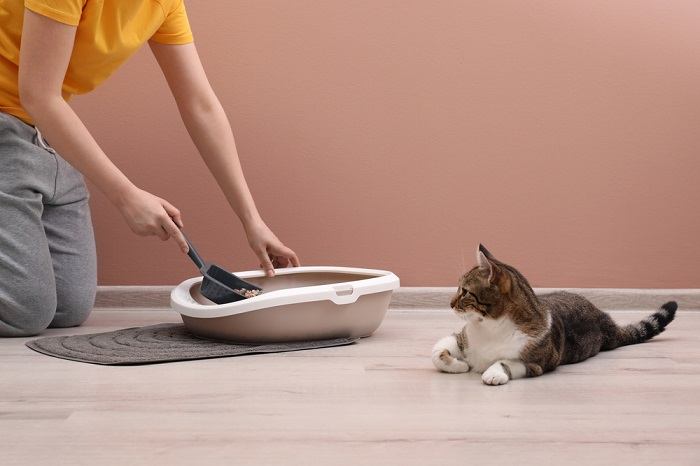
Dirty litter box or too clean (due to chemical scent), litter aversion, undesirable tray, location and substrate can influence a cat’s use of their latrine. You would possibly find your cat is comforted by the texture of your blanket or mattress finding it soft, more appealing and cleaner to pee on as an alternate.
Even carpets and empty bathtubs could also be more appealing. Once they find a brand-new favourite peeing spot, this might change into their preferred alternative.
Inter-Cat Conflict
Inter-cat fights and aggressive interactions are common in multi-cat households particularly with unrelated individuals who made to share insufficient resources in confined spaces.
Kitties denied opportunity for daily play/predatory behaviour with inadequate hiding and retrieval sites from volatile situations may urinate in different locations.
Furthermore, antagonistic moggies may block resources to litter trays exacerbating the necessity for your cat to resort to peeing on your personal bed because of anxiety, the need for privacy along with cushion elevation safety aspect.
Behavioural Depression Because of Human or Companion Pet Loss
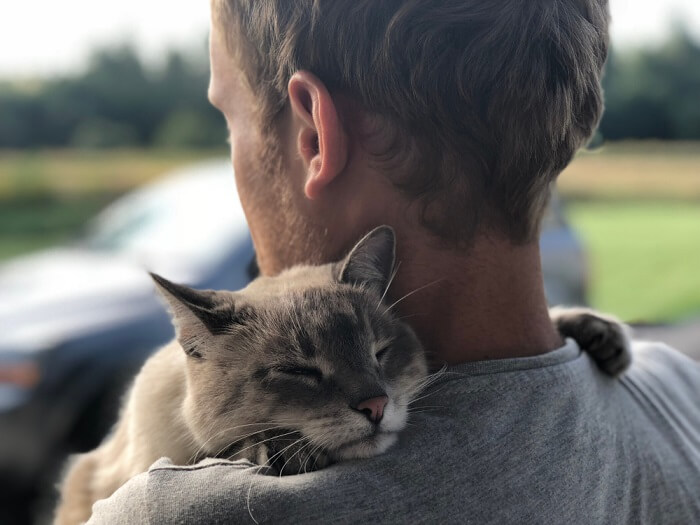
Cats are emotional creatures and can experience sadness, depression, low mood and reduced interest in play
Cats like people can suffer behavioural depression when losing a loved family member: pet and human alike. Sadness, depression, low mood, reduced interest in play or increased dependency on an owner can cause your cat to urinate on high value areas like your queen-bed or where the scent of the missing human/pet remains.
Difficulty Getting Out of Bed and Cognitive Decline
Felines diagnosed with Degenerative Joint Disease (DJD), Diabetes and blindness may find it difficult or disorientating to leap off the bed when nature calls causing bed-wetting accidents.
Feline cognitive dysfunction (feline dementia) effects cats similarly to humans. The behavioural signs are evident in moggies older than 10 years of age; cats become disoriented, sleep more, indifferent to food/water, stare into space and may urinate/defecate on owner’s davenport since it has their familiar scent.
Social and Environmental Stressors
Both social and environmental stressors can produce chemical and hormonal imbalances resulting in anxiety, distress including urination on items. Peeing on our bed may function as a self-soothing behaviour that eases anxiety by simply trying to combine their scent with ours.
New furniture, carpet or curtains may contribute to peeing outside the latrine on beds and couches, the straightforward reason is new smells of any kind can act as a stressor or stimulant, likewise the lack of the individual cat’s scent can do the identical.
Other contributing causes include addition of a brand-new pet, house relocation, major renovations and a new person or toddler within the home. Increase positive association with new people by way of treat-giving and playtime.
How To Stop Your Cat Peeing on the Bed?
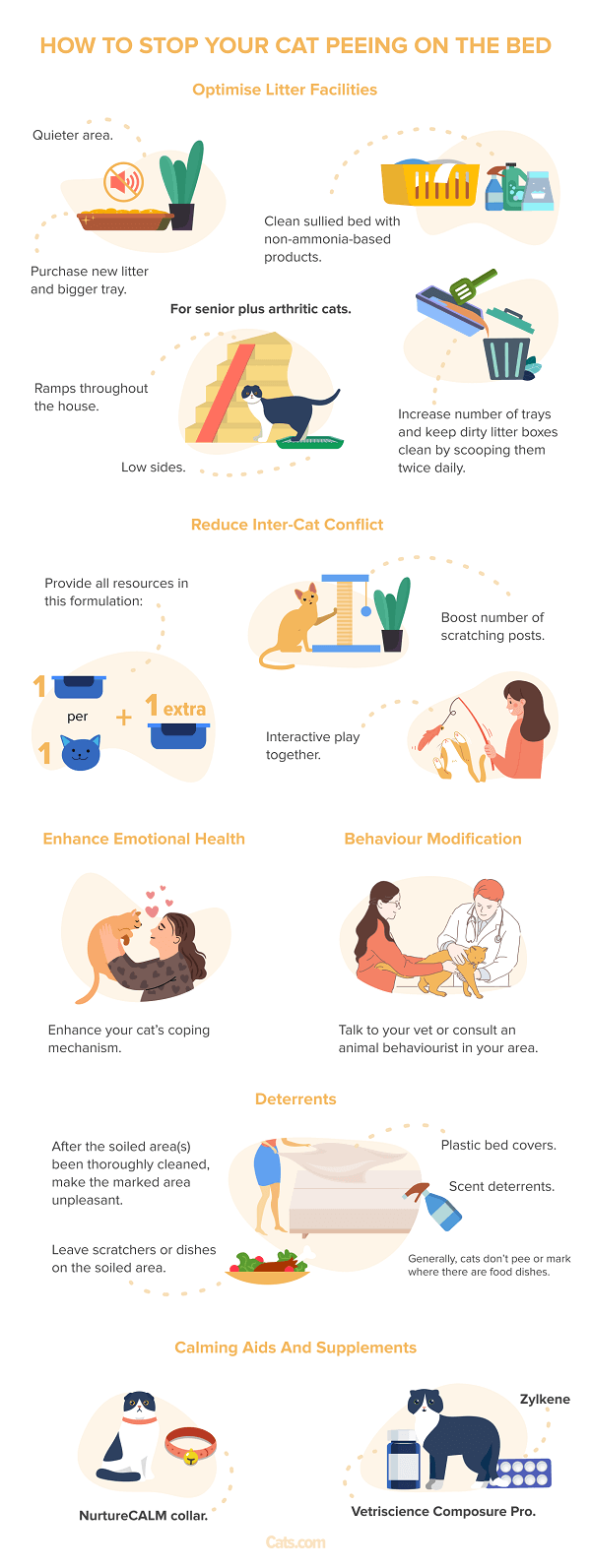
Claim back your bed and break the cycle of ‘unacceptable elimination’ by enhancing your cat’s environment and emotional health.
Optimise Litter Facilities
Tackle the litter facility by making it more appealing while clean sullied bed by removing both the stains and also the odour with non-ammonia-based products.
Either make the litter box more attractive, relocate it to a quieter area or purchase new litter and bigger tray that best meets your individual cat’s needs.
Increase number of trays and keep dirty litter boxes clean by scooping them twice daily. Keep in mind; we don’t like dirty toilets and neither do cats.
Lastly, for senior plus arthritic cats ensure litter trays are conveniently accessible with low sides nearby for easy entry in conjunction with ramps throughout the house for elderly moggies having problems going up/downstairs.
Reduce Inter-Cat Conflict
Provide all resources in this formulation: ‘one per cat plus one’ positioned in several locations to limit rivalry while designate several spots within the home as feeding stations to eliminate intimidation.
Increase daily exercise and mental stimulation with interactive play together with regular sensory, olfactory and cognitive enrichment.
Boost number of scratching posts – both vertical and horizontal. Scraping columns should be positioned near entrances, beds and eating stations to offer surface availability in places of potential competition since felines will scratch to convey territorial rights when other cats are around.
Enhance Emotional Health
Enhance your cat’s coping mechanism by minimising negative experiences and maximising opportunity for positive interactions by building confidence and resilience.
Behaviour Modification
Once all environmental stressors are addressed, a customized behaviour modification plan will have to be designed and implemented to deal with soiling issues. Talk to your vet or consult an animal behaviourist in your area.
Deterrents
After the soiled area(s) been thoroughly cleaned and while rehabilitating your cat, make the marked area unpleasant by placing plastic bed covers or plastic carpet runners turned over, use scent deterrents, or leave scratchers or dishes on the soiled area. Generally, cats don’t pee or mark where there are food dishes.
Also Read: The 5 Best Cat Scratch Deterrents
Calming Aids and Supplements
NurtureCALM collar utilises pheromone technology to assist alter behaviour caused by fear and/or stress and should be useful preventatively to calm your pet for a period of 30 days. Consult your vet to determine if this collar is suitable for your kitty.
Zylkene or Vetriscience Composure Pro is also beneficial to support the comforting additionally to behaviour modification.
Also Read: Best Calming Aid for Cats
Conclusion
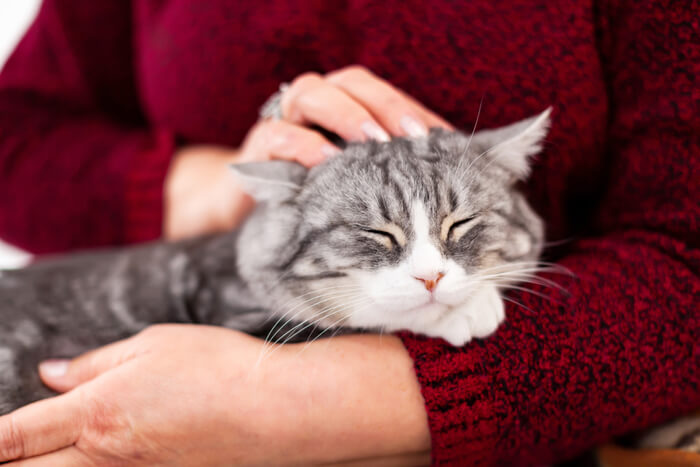
Emotional support cats help their owners cope with anxiety, PTSD, depression and other mental disabilities.
Early intervention consisting of a holistic health-check is crucial to eliminate bed-staining becoming a long-term habit.
Most cases are treated successfully with supplementation, environmental as well as behavioural modification together with medication for severe cases.
Set your cat for success with patience and persistence, don’t expect quick overnight results!
Frequently Asked Questions
How do I stop my cat from peeing on my bed?
To stop your cat from peeing on your mattress it’s vital to increase the desirability of the area you want your cat to use and reduce the attractiveness of the area your cat wants to use.
Do cats pee out of spite?
Cats don’t pee out of spite. A cat’s sensory system is unique, they perceive the environment in an exceedingly different way to humans. Your cat isn’t looking for vengeance; they’re providing you with a clue that something isn’t right with them or at home, and that they need your help!
Why is my cat peeing on my bed and couch?
Reasons for house soiling can range from medical to behavioural causes together with litter tray problems including social and environmental stressors.
Avoid adding furniture with strong smells, manufactured overseas which might be aversive by the cat and will cause them to eliminate on/under/beside the new item.
Why is my cat suddenly peeing on my furniture?
Medical evaluation and intercession is required when a cat suddenly eliminates outside the litter box since there may be several medical reasons causing abrupt peeing on fixtures.
Acute stress thanks to unexpected event or threat are often a significant contributing cause while emotional distress or nervousness from seeing an owner pack to travel can trigger unexpected elimination.
-
Heath, I. R. (2016). Feline Behavioral Health and Welfare. St Louis, MO: Elsevier. Pg 337, 355-358, Retrieved June 24, 2021
-
Heath, S. (2019). Unacceptable indoor elimination. Journal of Feline Medicine and Surgery, 21, 199-208. Retrieved June 20, 2021
-
Moore, A. (2018). Why Cats Mask Their Pain. In A. Moore, Cat Behavior Book (p. 6). Retrieved June 26, 2021
-
Workman, M. K. (2020). Feline Inappropriate Elimination Disorder: House-Soiling. (IAABC, Compiler) USA. Retrieved June 24, 2021

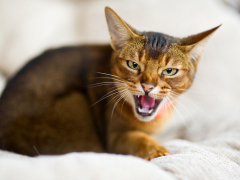
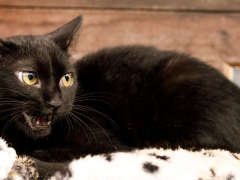
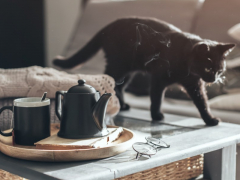

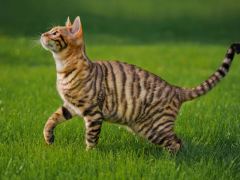


I would like to know More about a female Main Coon peeing on a bed. She had a Urin test and nothing Physical was found. I am using Infusers, medication in soft food, clumping and non clumping litters and relaxation spray!!
Hi Molly,
I’m sorry to hear about your female Main Coon peeing on the bed.
Glad you started with a medical check up, did your vet rule out or mention Feline Idiopathic Cystitis? Behaviour like increased startle response, anxiety and over-attachment to an owner have all been reported in cats with FIC.
When medical analysis and FIC have been ruled out, it’s essential to determine whether or not the house soiling represents elimination or marking (if unsure please take video footage).
There are two main influencing factors for house soiling that isn’t related to a medical condition or FIC: Littery tray problems and distress linked with a negative emotional state. For any non-medical disparity it’s vital to methodically assess the cat’s lifestyle and environment to look for the cause of the house soiling.
Are you able to ask your vet for a referral to a Cat behaviourist if the main predisoposing factors isn’t medical or FIC related? Ruling out all potential underlying medical causes by a vet and considering the differential of FIC, is a priority.
Hope this answers some of your questions.
Warm regards,
Melina